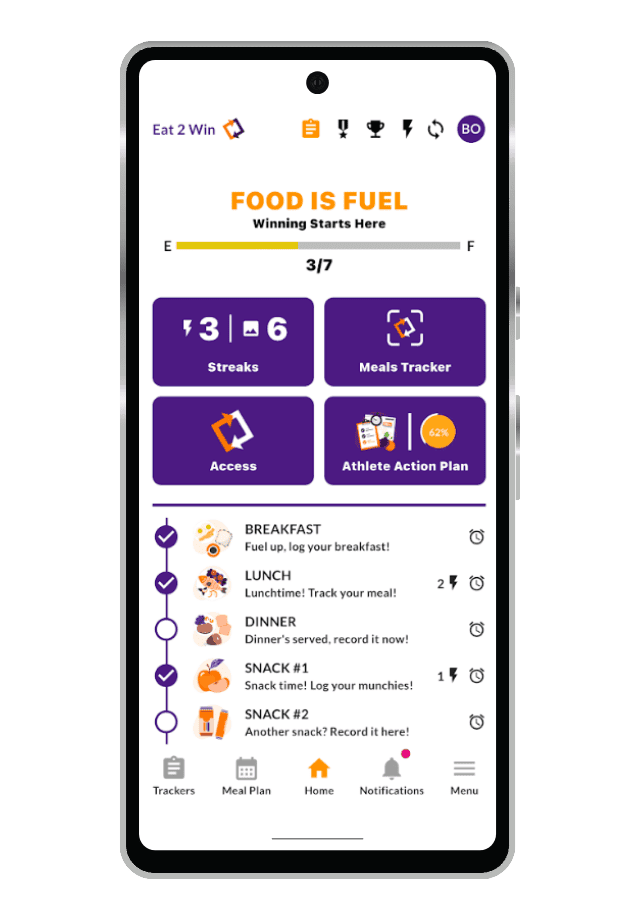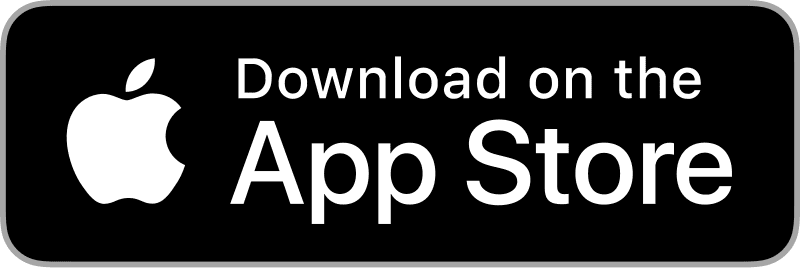Next Level Podcast with Host Tavis Piattoly, MS, RD, LD
- blakegriffinfinalmp3-converted00:00
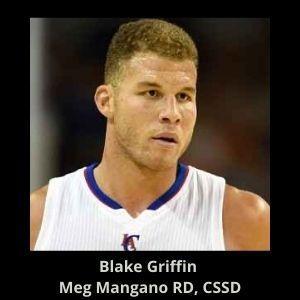
Blake Griffin
NBA All-star
Meg Mangano RD, CSSD
Sports Dietitian for LA Clippers
Fueling an NBA All-star can be a big challenge. Meg Mangano is the lead Registered Dietitian/Nutritionist for the LA Clippers, is Board Certified as a Specialist in Sports Dietetics, a Certified LEAP Therapist, and serves on the advisory board to All-Pro Science and runs her company/private practice, REJOOV, LLC. In this podcast, Meg and Blake Griffin discuss the challenges of fueling for an NBA-All star, and the sports nutrition strategies they use to fuel for peak performance.
In this podcast you will learn:
Meg's Interview
- What made Meg want to work in the field of Sports Nutrition?
- What are 2-3 common mistakes the athletes she sees make with their diet?
- What are some things she looks for when conducting an athlete’s nutrition assessment that can make an immediate impact on performance, health, or recovery?
- Is there anything different about the life of an NBA player that makes it challenging for them to get the calories they need to perform well?
- Are food sensitivities something she is evaluating more often with her athletes?
- Has she noticed when athletes eliminate high trigger foods, do they make a difference in their performance, health, and/or recovery?
- Are there any specific supplements she recommends for NBA players and if so, what’s the specific purpose of those supplements?
- If there is one piece of advice regarding nutrition she would give to a young athlete, what would it be?
Blake's Interview
- At what point in Blake's career did be start to realize nutrition is an important piece of the puzzle to help elevate your performance?
- How was Blake’s diet different from his college playing days to now being in the NBA?
- What are some of the challenges he faces with his diet during the season, especially if he goes on a long road trip?
- What has Meg taught him that has made a big difference in the way he looks at nutrition or take care of his body?
- Does he feel nutrition gives him an advantage over guys he’s competing against that may not take their nutrition seriously?
- What’s his favorite Pre-Game meal?
- If there is one piece of advice regarding nutrition he could give to a young athlete, what would it be?
Podcast Transcript
0:00 Opening Remarks from Tavis + Introduction of Meg and Blake
3:05 Meg's interview begins
3:05 What made you want to work in the field of Sports Nutrition?
- Always been involved in sports (soccer, basketball, lacrosse)
- Played lacrosse at the collegiate level and grew up in a health conscious household which prioritized nutrition
- Took a nutrition course in college and knew the deal was sealed
- Very interested in the concept of how what we eat can affect our performance
4:39 From your experience, what are 2-3 common mistakes athletes make with their diet?
- The most common mistakes that I see are poor food quality (overusing convenient items - fast food)
- Leaving the house without food and fluid which leads to not going to eat or are more apt to make poor choices if they don't have their own selection of food/fluids from house
- Going into performance (practice) on an empty stomach/under fueled
6:23 What are some things that you look for when conducting a nutrition assessment on an athlete that can make an immediate impact on performance, health, or recovery?
- First and foremost is hydration. Hydration is always my number 1 thing. I have yet to have 1 athlete or client where hydration is not their number 1 goal. It is so easily overlooked yet it is so impactful on performance and health. It is also one of the more non-threatening nutrition modifications to start working on and improve on
- Everyday nutrition including what time you are eating and how often, and what is the composition of your meals and snacks, and we build goals around that. It's about pulling out things we can work on and build on to improve foundational nutrition.
8:05 Is there anything different about the life of an NBA player that makes it challenging for them to get the calories they need to perform well?
- For a NBA player the challenge is the number of games that they have, travel which is frequent and includes different time zones and even climates, commitments outside of basketball (family, charity work, events). There are a lot of things going on that can affect how an NBA athlete is able to fuel.
10:15 Are food sensitivities something you are evaluating more often with your athletes?
- Absolutely. When you’re ready to take on a more individualized approach with what is working well, or against you, food sensitivity can be a good tool to use.
- Goes through a questionnaire with a variety of symptoms that may be related to food sensitivities.
- Food sensitivity tests ultimately lead to a much more individualized approach as to what is going on inside our bodies and is based on gut and immune system, so it is a very thorough look.
11:50 Have you noticed any differences in performance, health, and/or recovery when an athlete eliminates high trigger foods?
- The number 1 difference that is reported to me from my athletes that are removing high-trigger foods is improved sleep which can equate to increased feelings of energy
- Decreases in GI issues, quicker recovery, decreased soreness and ability to maintain ideal body composition.
- I think all of this is coming from eating right based on the food sensitivities but just eating better in general by getting cleaner foods into the body
14:00 Are there any specific supplements you recommend for NBA players and if so, what’s the specific purpose of those supplements?
- This answer is two fold, coming from a micronutrient standpoint, a blanket recommendation is to find a quality and NSF certified multivitamin
- Potentially fish oil and vitamin d depending on tested levels
- There are so many nutrients needed to keep our bodies functioning optimally. Fortunately we have the proper tools to do micronutrient testing to make more individualized recommendations to replenish through food and supplements.
- Generally as an athlete you have higher needs and more trauma going on in the body, so being able to fill in the gaps with a multivitamin is a good start. Especially if it is certified as safe.
- On the more foundational side we are looking at pre- during and post- to support training and recovery, so we can use whole foods or convenient items. Most important is what the athlete can tolerate and how much.
17:10 What is one piece of advice regarding nutrition that you would give to a young athlete?
- Start healthy practices early. Pick out one goal to work on (ex. hydration) and build on it. The earlier the better because once you get a handle on good nutrition and great fueling and how they affect you the better you are going to be able to adjust throughout different stages of your career.
18:07: Blake’s interview begins
18:07 At what point in your career did you start to realize nutrition is an important piece of the puzzle to help elevate your performance?
- Nutrition has always been important to me and with each stage of my career I’ve built upon previous knowledge that I had. When I got to college I was a health and exercise science major, so I took nutrition classes and really started to understand the importance.
19:22 Was your diet different during your college playing days to now being in the NBA?
- In college I had somewhat of an understanding, but there were times I had to settle for certain things. The past 4-5 years working with Meg and the tools that are available through the team have really taken things to the next level for me.
20:20 What are some of the challenges you face with your diet during the season, especially if you go on a long road trip?
- It is really exactly what she was talking about; the late night travel, eating on the plane, trying to balance when to eat, rest, and hydrate is challenging.
- For me, hydrating the right way has been really important especially when we have 3 games in 4 days. I can tell a huge difference throughout the course of the game if I’m hydrated properly or not. This year I’ve really tried to work on staying hydrated.
20:21 What has Meg taught you that has made a big difference in the way you look at nutrition or take care of your body?
- There are almost too many to list. When I started to do the food sensitivity testing it opened my eyes to how individualized everything can be: what is healthy for someone else may not be for me.
- Customizing your diet to what is going to work best for you is the biggest thing I’ve learned.
- The other important thing I’ve learned is the importance of variety. It can be convenient to replicate your foods and eat the same things everyday, but trying to mix it up is something big I’ve learned from Meg.
22:33 Do you feel nutrition gives you an advantage over guys you’re competing against that may not take their nutrition seriously?
- Absolutely. When you get to this level, everyone is a good basketball player and is there for a reason. Trying to use every advantage (getting the right recovery, or nutrition), is something I can control, which can give me the advantage.
- All the work Meg does for us really gives us the advantage particularly in the 4th quarter or in over-time when others are running out of fuel.
24:00 What’s your favorite Pre-Game meal or something that you feel works best for you?
- Turkey bolognese with gluten free pasta. I always like to eat some kind of pasta as part of my pre-game meal.
- Some others that I might have include: barbeque chicken with sweet potatoes; salmon, rice, and a vegetable
24:58 What is one piece of advice regarding nutrition that you would give to a young athlete?
- One thing I would say is keep it somewhat simple and don’t try to over do it. Start making small adjustments, start drinking water instead of soft drinks, and once you have that down move on to something else. Take small steps to get to that big goal.
- Ask questions to anyone that has a nutrition background because anything helps.
26:20 Closing remarks from Tavis
Eat 2 Win Nutrition App
Fuel the Champion Within
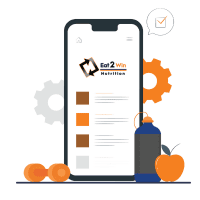
Trackers
Stay on target with cutting-edge trackers that monitor every step of your journey, ensuring you never miss a beat.
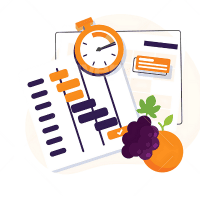
Meal Plan Guides
Simplify your nutrition with easy-to-follow, personalized meal plans that fuel your performance.
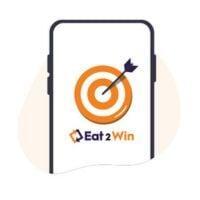
Gamification
Stay motivated and engaged by earning rewards and climbing leaderboards as you hit your fitness and nutrition goals.

Access a Sports Dietitian
Get expert guidance and personalized support from a certified Sports Dietitian whenever you need it.
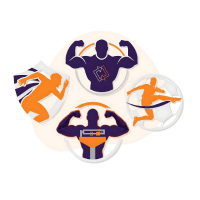
Personalized Programs
Unlock your full potential with personalized programs meticulously crafted to match your unique lifestyle and fitness aspirations.

